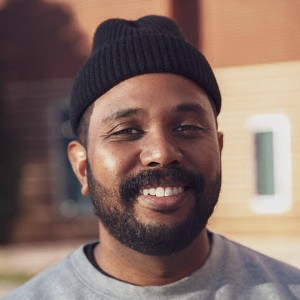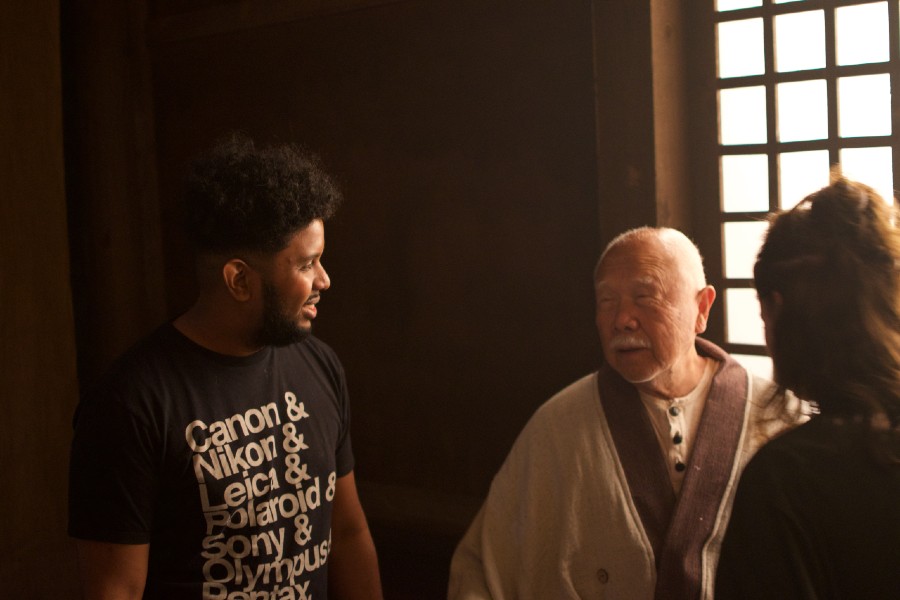MFA film program alum Spencer Glover selected for Disney’s Launchpad series
Logan Butts |

Spencer Glover (Middle row, left)
For Spencer Glover (‘17), it has been the small things that made his current situation sink in.
“It’s these small things that just make me feel so like overwhelmed with joy. Like when we got our Disney email addresses a couple of weeks ago and I'm like, “I have a Disney email address.”

Spencer Glover ('17)
Glover, a graduate of Lipscomb’s Master of Fine Arts Film program, was recently selected to participate in season two of Launchpad, a Disney+ series in which newcomer directors are selected from over 2,000 applicants to develop a live-action short film over the course of a season.
The participants will spend a year taking classes at the American Film Institute, receiving mentorship from Disney leadership, and eventually producing a short film surrounding season two’s theme of connection. The films will be streamed on Disney+ in the spring of 2023.
“Right now we're in development on the script. So that means that we're doing rewrites and breaking the story, making sure that we're hitting certain points and telling it through that Disney lens. And then after development, we go into pre-production, so that'll be another two months, and then we shoot the film in the summer.”
After about 10 weeks of production starting in the summer, they will spend the rest of 2022 in post-production to ready the film for its 2023 release.
“I’m taking it all in because this is a big thing for me. It's Disney. We all know, Disney. We grew up on Disney; I grew up on Disney. So it's really important for me to tell the best story that I can and really deliver on this. And I know, if I do that, the other things will come next.”
Glover accidentally discovered Launchpad while browsing Disney+ one night. After researching the program, he ended up submitting his short film Message Read, a “love letter” to his father that passed away, as part of his application because it also displayed the season’s theme of connection.
Glover and his fiance Kariss Forte live in Los Angeles, but they happened to be back in Nashville working with the Lipscomb Academy football team on a project when he received the message that he had been selected for an interview.
“I did the first interview, and it was great. It was about 15 minutes with the coordinators of the program. They were really kind people, and I knew they were selfless. I felt like this thing was going to be good.”
After a series of interviews and pitches, Glover was officially added to the season’s lineup of 12 filmmakers. Since January, he has been working on his short film, which is a script from one of the other contestants that he has to direct.
“My short film is called Black Belts. In short, it's Kung Fu in Compton. So, I'm excited to be bringing the story to life.”
Similar to his happenstance discovery of the program, Glover originally became interested in filmmaking after stumbling across a student-run college news program at his undergraduate university, Tennessee State.

Spencer Glover (left) on set at the proof-of-concept trailer that he filmed as his capstone project at Lipscomb.
He originally intended to go into television direction, but one of his professors at Tennessee State, Melissa Forte, now the Chair of Cinematic Arts program at Lipscomb, convinced him to give narrative filmmaking a try.
“From then, after I started making short films and connecting with people in the industry, I thought back to my childhood. I realized, ‘wait a minute, I loved films as a kid.’ Films for me were so so visceral. I remember watching Jurassic Park and Forrest Gump and just feeling all of these emotions and feelings while watching these movies.”
Now, 10 years later, after experiencing every level of filmmaking, he finds himself directing a Disney production. Glover credits Forte with pushing him in that direction and the film program in general for providing guidance.
“My time at Lipscomb was really great. Melissa Forte, she’s been my favorite professor and a great friend and a great mentor over the years. Coming across Steve Taylor in the program was great. He gave great advice and pushed me in a way to create and think about projects differently.”
Among the areas he thought Lipscomb’s program was most beneficial to his burgeoning career were the collaborative environment and the experience of the faculty.
“My cohort was especially great. We just bonded together and helped each other out as much as we could, on all of our films. I think that environment is really important when you're trying to create something.
“When you have professors that have real-world experience, they're able to look at your ideas and your writing in a way that's like ‘I can see it from the academic standpoint. But I can also see it from the real world standpoint of how does this fit into the zeitgeist of films right now or how does this help tell this story.’ It's invaluable.”